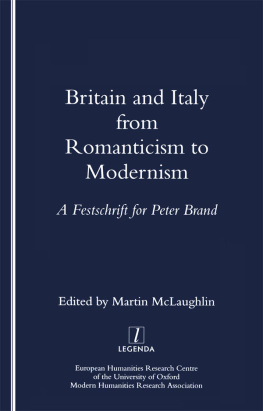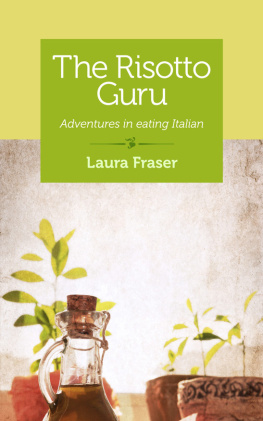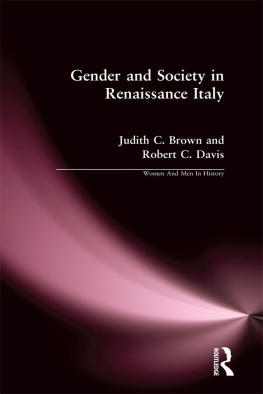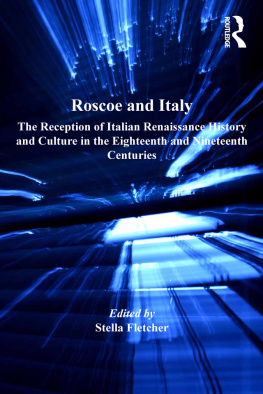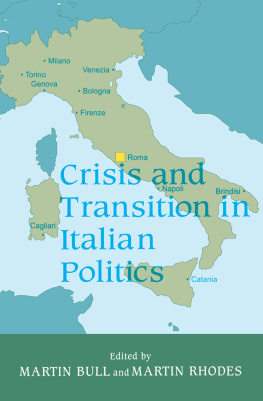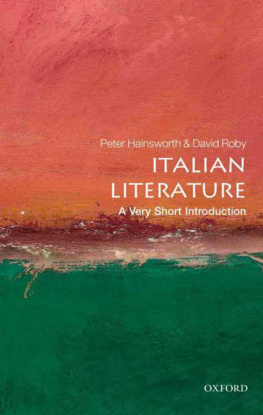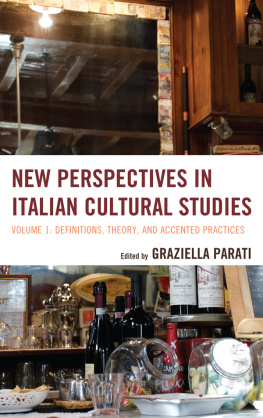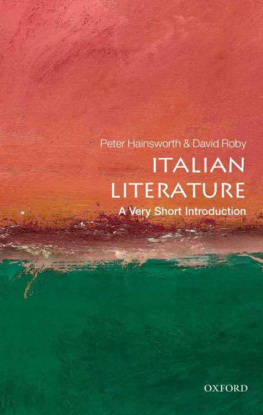B RITAIN AND I TALY FROM R OMANTICISM TO M ODERNISM
The European Humanities Research Centre
UNIVERSITY OF OXFORD
The European Humanities Research Centre of the University of Oxford organizes a range of academic activities, including conferences and workshops, and publishes scholarly works under its own imprint, LEGENDA. Within Oxford, the EHRC bridges, at the research level, the main humanities faculties: Modern Languages, English, Modern History, Literae Humaniores, Music and Theology. The Centre stimulates interdisciplinary research collaboration throughout these subject areas and provides an Oxford base for advanced researchers in the humanities.
The Centres publications programme focuses on making available the results of advanced research in medieval and modern languages and related interdisciplinary areas. An Editorial Board, whose members are drawn from across the British university system, covers the principal European languages. Titles include works on French, German, Italian, Portuguese, Russian and Spanish literature. In addition, the EHRC co-publishes with the Society for French Studies, the British Comparative Literature Association and the Modern Humanities Research Association. The Centre also publishes Oxford German Studies and Film Studies, and has launched a Special Lecture Series under the LEGENDA imprint.
Enquiries about the Centres publishing activities should be addressed to:
Professor Malcolm Bowie, Director
Further information:
Kareni Bannister, Senior Publications Officer
European Humanities Research Centre University of Oxford
47 Wellington Square, Oxford OXi 2JF
enquiries@ehrc.ox.ac.uk
www.ehrc.ox.ac.uk
Legenda Editorial Board
Chairman
Professor Malcolm Bowie, All Souls College
Editorial Coordinator in Italian
Dr Diego Zancani, Balliol College
Professor Ian Maclean, All Souls College (French)
Professor Marian Hobson Jeanneret, Queen Mary,
University of London (French)
Professor Ritchie Robertson, St Johns College (German)
Professor Lesley Sharpe, University of Bristol (German)
Dr Diego Zancani, Balliol College (Italian)
Professor David Robey, University of Reading (Italian)
Dr Stephen Parkinson, Linacre College (Portuguese)
Professor Helder Macedo, Kings College London (Portuguese)
Professor Gerald Smith, New College (Russian)
Professor David Shepherd, University of Sheffield (Russian)
Dr David Pattison, Magdalen College (Spanish)
Professor Alison Sinclair, Clare College, Cambridge (Spanish)
Dr Elinor Shaffer, School of Advanced Study, London
(Comparative Literature)
Senior Publications Officer
Kareni Bannister
Publications Officer
Dr Graham Nelson
Legenda
E UROPEAN H UMANITIES R ESEARCH C ENTRE
M ODERN H UMANITIES R ESEARCH A SSOCIATION
First published 2000
by the European Humanities Research Centre of the University of Oxford
in conjunction with the Modern Humanities Research Association
LEGENDA is the publications imprint of the
European Humanities Research Centre
Published 2017 by Routledge
2 Park Square, Milton Park, Abingdon, Oxon OX14 4RN
711 Third Avenue, New York, NY 10017, USA
Routledge is an imprint of the Taylor & Francis Group, an informa business
All rights reserved. No part of this publication may be reproduced, stored in a retrieval system, or transmitted in any form or by any means, electronic, mechanical, including photocopying, recordings, fax or otherwise, without the prior written permission of the copyright owner and the publisher.
British Library Cataloguing in Publication Data
A CIP catalogue record for this book is available from the British Library
2000 European Humanities Research Centre of the University of Oxford
and the Modern Humanities Research Association
LEGENDA series designed by Cox Design Partnership, Witney, Oxon
Product or corporate names may be trademarks or registered trademarks, and are used
only for identification and explanation without intent to infringe.
ISBN-13: 978-1-90-075530-6 (pbk)
At the beginning of October 1988 I moved to the University of Edinburgh to take over the Chair of Italian from Peter Brand upon his retirement. I had read Peters books on Tasso and Ariosto, I had occasionally met himI remember us working together as External Examiners at Reading in the late Seventiesand I was attracted by the high reputation of his department, but I didnt know Peter personally. This lack of communication between fellow Italianists was not an exceptional state of affairs. In 1988 I can hardly say I was familiar with any Italian chair-holder except, of course, Gigi Meneghello, who had originally imported me to Reading. The opportunities for interdepartmental exchange were rare, and in any case, like other colleagues of my generation, I felt that Professors inhabited a rarefied sphere of their own. All this was made worse by the fact that Peter Brand lived and practised his art in the far North, at the other end of Britain, indeed in another country. Paradoxically, his retirement gave me the opportunity to get to know him, and to appreciate what a wonderful person he is.
One of the first things which struck me as I settled down in Edinburgh was how highly regarded and well known Peter was throughout the university. Such a degree of popularity was, in my experience, unusual for an Italianist. My impression was that Professors of Italian by and large tended to be much more devoted to scholarship than to university business. But Peter was exceptional as an Italianist in that he had not only published major books and occupied the highest positions in our professional associations (for many years he had edited the Modern Language Review and had been actively involved in the Society for Italian Studies and its journal Italian Studies), but he had also been Dean of the Faculty of Arts and, more recently, Vice-Principal of the University of Edinburgh. This was an outstanding record of service for any professor, let alone a professor of Italian, but Peter bore it with great modesty. His attitude was simple and matter-of-fact: as an employee of the University he had done what he thought was right for him to do. Once retired, he was perfectly happy to be free of all that and instead devote himself full-time to his allotment. The character that sprang to my mind was Cincinnatus.
Indeed Peter had, and still has, qualities that one seldom encounters in the academic world. He was cheerful, energetic, constructive, and very effective. His capacity to analyse and discuss any kind of problem (literary, academic, administrative) was fully matched by his ability and willingness to decide and take action and responsibility. At the same time he was blissfully free of all affectation and self-importance, and he disliked all forms of pompousness in real life as well as in literature. He had retired at the ordinary retirement age, but I never saw a more premature retirement, at least judging by the energy, dynamism, optimism, and enthusiasm that sprung from all his enterprises: from his famous gardening exploits (his tomatoes were already legendary) to his new study of disguise in the European theatre of the Renaissance; from his active participation in the annual departmental play to his continued teaching and advising of students and colleagues.

